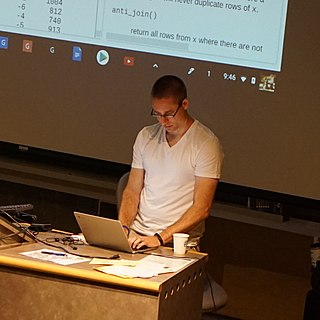Related Research Articles
Elizabeth A. Stuart is a professor of mental health, biostatistics, and health policy and management in the Johns Hopkins Bloomberg School of Public Health. Her research involves causal inference and missing data in the statistics of mental health. She was a co-author on a study showing that post-suicide-attempt counseling can significantly reduce the risk of future suicide.

Rafael Irizarry is a professor of biostatistics at the Harvard T.H. Chan School of Public Health and professor of biostatistics and computational biology at the Dana–Farber Cancer Institute. Irizarry is known as one of the founders of the Bioconductor project.
Louise Marie Ryan is an Australian biostatistician, a distinguished professor of statistics in the School of Mathematical Sciences at the University of Technology Sydney, president-elect of the International Biometric Society, and an editor-in-chief of the journal Statistics in Medicine. She is known for her work applying statistics to cancer and risk assessment in environmental health.
Mei-Ling Ting Lee is a Taiwanese-American biostatistician known for her research on microarrays. She is a professor of epidemiology and biostatistics at the University of Maryland, College Park, and the founding editor-in-chief of the journal Lifetime Data Analysis. She was president of the International Chinese Statistical Association for 2016.
Francesca Dominici is a Harvard Professor who develops methodology in causal inference and data science and led research projects that combine big data with health policy and climate change. She is a professor of biostatistics, co-director of the Harvard Data Science Initiative, and a former senior associate dean for research in the Harvard T.H. Chan School of Public Health.
Amy Helen Herring is an American biostatistician interested in longitudinal data and reproductive health. Formerly the Carol Remmer Angle Distinguished Professor of Children's Environmental Health at the University of North Carolina at Chapel Hill, she is now Sara & Charles Ayres Distinguished Professor in the Department of Statistical Science, Global Health Institute, and Department of Biostatistics & Bioinformatics of Duke University.
Grace Elizabeth Kissling is a biostatistician who works at the National Institute of Environmental Health Sciences as chief statistician for the National Toxicology Program.
Yvonne Millicent Mahala Bishop was an English-born statistician who spent her working life in America. She wrote a "classic" book on multivariate statistics, and made important studies of the health effects of anesthetics and air pollution. Later in her career, she became the Director of the Office of Statistical Standards in the Energy Information Administration.

Jeffrey Tullis Leek is an American biostatistician and data scientist working as a Vice President, Chief Data Officer, and Professor at Fred Hutchinson Cancer Research Center. He is an author of the Simply Statistics blog, and runs several online courses through Coursera, as part of their Data Science Specialization. His most popular course is The Data Scientist's Toolbox, which he instructed along with Roger Peng and Brian Caffo. Leek is best known for his contributions to genomic data analysis and critical view of research and the accuracy of popular statistical methods.
Amita Kalyanie Manatunga is a Sri Lankan biostatistician who works as a professor of biostatistics and bioinformatics at the Rollins School of Public Health, Emory University, where she is also affiliated with the Winship Cancer Institute. Her research interests include survival analysis, inter-rater reliability, environmental epidemiology, and medical imaging of the kidneys.
Sue Geller is an American mathematician and a professor emerita of mathematics at the department of mathematics at Texas A&M University. She is noted for her research background in algebraic K-theory, as well as her interdisciplinary work in bioinformatics and biostatistics, among other disciplines.
Brisa N. Sánchez is a Mexican-American biostatistician and environmental epidemiologist, whose research has included work on the spatial analysis of fast food restaurants, on nutrition in schools, on the relation between the characteristics of neighborhoods and the health of their residents, on the water infrastructure in Mexico City, and on latent variable models in environmental statistics. She is the Dornsife Professor of Biostatistics at Drexel University.
Leslie Ain McClure is an American biostatistician. She is a Full professor of biostatistics at the Drexel University School of Public Health and was the inaugural Associate Director of Diversity for the Statistical and Applied Mathematical Sciences Institute (2017–18).
Keumhee Carrière Chough is a Korean-Canadian statistician whose theoretical contributions include work on repeated measures design; she is co-editor of Analysis of Mixed Data: Methods & Application, and has also contributed to highly cited works on public health. She is a professor of mathematical and statistical sciences at the University of Alberta.
Hongmei Zhang is a Chinese-American biostatistician at the University of Memphis, where she is Bruns Endowed Professor in the Division of Epidemiology, Biostatistics, and Environmental Health Sciences, director of the division, program coordinator for biostatistics, and affiliated professor in the departments of mathematical sciences and biology. Her statistical interests include feature selection, biclustering, and Bayesian networks; she is also interested in the application of statistical methods to phenotype and genetic data and to epigenetics.
Clarice Ring Weinberg is an American biostatistician and epidemiologist who works for the National Institute of Environmental Health Sciences as principal investigator in the Biostatistics and Computational Biology Branch. Her research concerns environmental epidemiology, and its combination with genetics in susceptibility to disease, including running the Sister Study on how environmental and genetic effects can lead to breast cancer. She has also published highly cited research on fertility.

Susan Kathryn Gregurick is an American computational chemist. She is the associate director for data science at the National Institutes of Health (NIH). Gregurick is the director of the NIH Office of Data Science Strategy.
Fan Li is a Chinese-American biostatistician whose research includes causal inference and propensity score matching, and their application to comparative effectiveness research in health care. She is a professor in the Duke University Department of Statistical Science, with a secondary appointment in Duke's Department of Biostatistics and Bioinformatics.

Alison Anne Motsinger-Reif is an American biostatistician and human geneticist specialized in association analyses, big data, and genomic analyses. In December 2018, she became the chief of the biostatistics and computational biology branch at the National Institute of Environmental Health Sciences. Montsinger-Reif was previously a professor of statistics at the North Carolina State University.
Robert L. Strawderman is an academic biostatistician and researcher who holds the Donald M. Foster, MD Distinguished Professorship in Biostatistics at the University of Rochester. He has served as chair of the Department of Biostatistics and Computational Biology since 2012. Strawderman's principal research interests include semiparametric methods for missing and censored data and statistical learning methods for risk and outcome prediction. Contributions in numerous other areas include inference and variable selection in the areas of dynamic treatment regimes and causal inference in mediation analysis and for recurrent events.
References
- ↑ "Sally W. Thurston, PhD", Faculty, URMC Department of Biostatistics and Computational Biology, retrieved 2024-02-10
- 1 2 3 Short CV (PDF), Math Alliance, October 17, 2014, retrieved 2024-02-10
- ↑ Sally Thurston at the Mathematics Genealogy Project
- ↑ "Hassler Whitney, 82, innovator in geometry", Chicago Tribune, May 13, 1989, retrieved 2024-02-10
- ↑ Kendig, Keith (2018), Never a Dull Moment: Hassler Whitney, Mathematics Pioneer (PDF), Spectrum, vol. 93, MAA Press, p. xii, ISBN 978-1-4704-4828-8
- ↑ 2019 ASA Fellow announcement (PDF), American Statistical Association, retrieved 2024-02-10